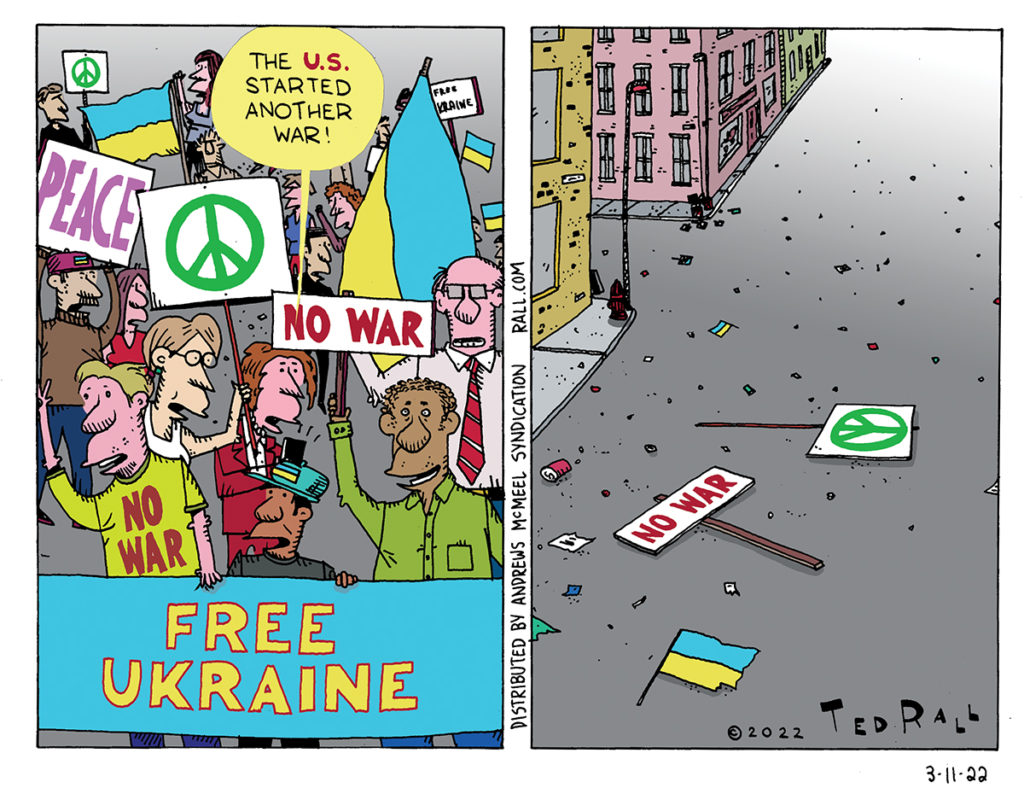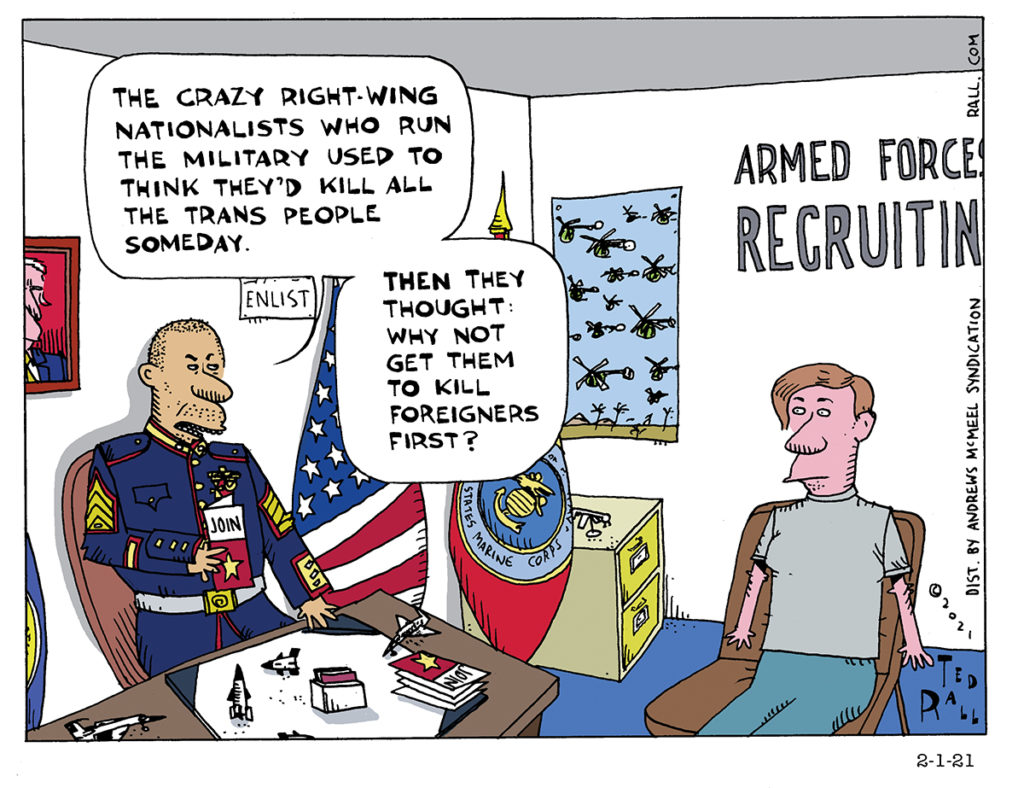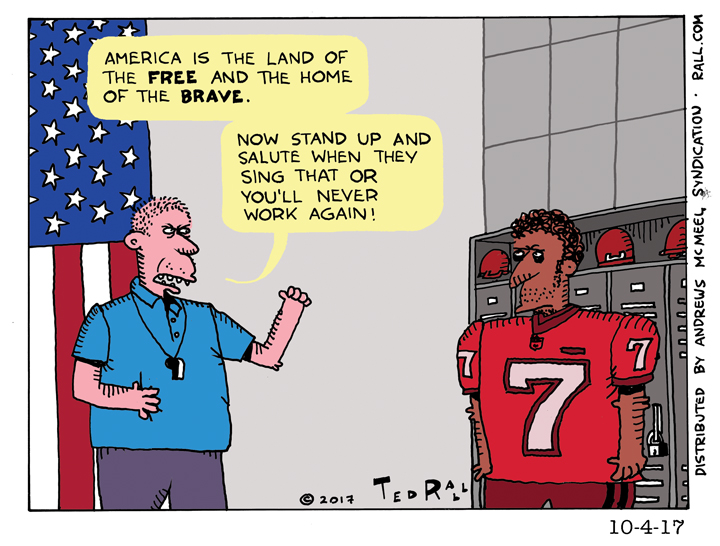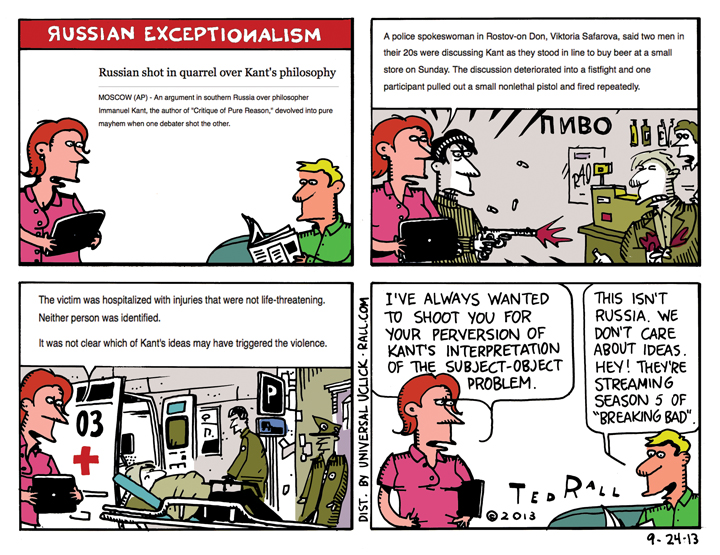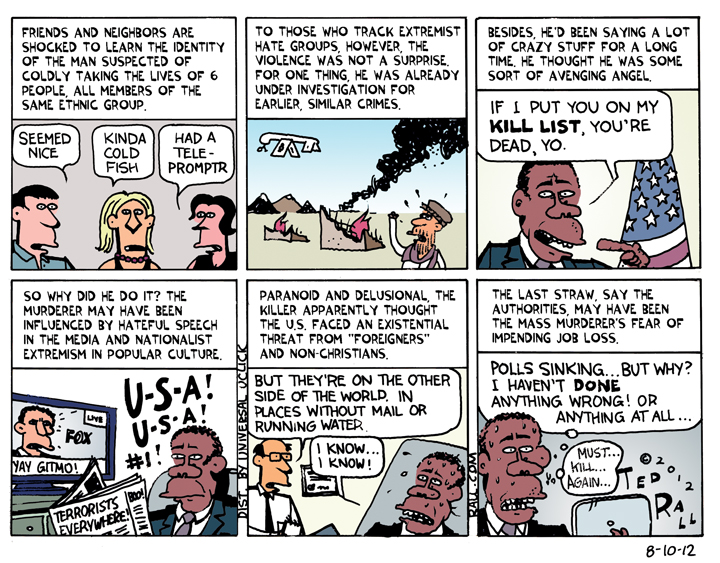Many Americans, both Democrats and Republicans, are protesting angrily about Russia’s invasion of Ukraine. But the peaceniks-come-lately were nowhere to be found over the last two decades as the United States invaded Afghanistan and Iraq, waged a brutal proxy war in Yemen and Syria, destroyed Libya and terrorized much of the world with assassination drone planes. When the US is the guilty party, citizens of the US are silently complicit. The hypocrisy is breathtaking.
SYNDICATED COLUMN: The Pledge of Allegiance is anti-American

Right-wingers conflate nationalism with patriotism. But they’re not the same thing. Patriots love their country because it does good things; for nationalists it’s our country right or wrong. A lot of stuff nationalists call patriotic couldn’t possibly be more un-American.
The singing of the national anthem before sporting events, and the reciting of the Pledge of Allegiance, are prime examples.
The latest nationalism vs. patriotism controversy arrives courtesy of Colin Kaepernick, the African-American pro football player blackballed by the NFL for kneeling in silent protest over police shootings of blacks rather than stand for the signing of the national anthem alongside his teammates and fans before games. The “take a knee” movement has spread throughout the league, largely in response to President Trump’s crude remark that those who refuse to stand during “The Star Spangled Banner” are “sons of bitches.”
At football games and similar events where the anthem is sung, standers far outnumber kneelers — and that’s weird. Because if one person is kneeling against police brutality, then it stands to reason that standing up means you support cops gunning down unarmed black people. Are there really that many racists?
That, and when you stop to think about it, the whole idea of rote rituals to prove our loyalty run completely counter to what most Americans, liberal or conservative, think their country is about.
As I have written before, lefties and righties don’t have the same ambitions for the U.S. Following the tradition of the French Revolution and the Declaration of the Rights of Man, the Left idealizes individual rights. They dream of a country where everyone is not only created equal, but treated accordingly. The Right values empire. Rightists’ ideal America is a global military and economic superpower.
Still, the two sides have something in common. They want to be left alone, to live their lives as free of government interference as possible. Progressives want the government out of their bedrooms. Traditionalists want it out of their incomes. Totalitarianism — a form of government whose control over citizens’ daily lives leads to the requirement that everyone attend one meeting after another and report dissent to the authorities — could no more catch on here than North Korean-style displays of signs flipped by synchronized flags or parades of military hardware (though Trump wants to start those).
Like the singing of the anthem at games, the Pledge of Allegiance reflects a totalitarian impulse you find in fascist and authoritarian regimes, not democracies. The U.S. and Canada are the only countries on earth where national anthems are played at the start of sporting events. Even in many authoritarian states, the requirement that children (and athletes) swear fealty to the nation (or, as here, its flag) would be considered too creepy to contemplate.
When your country is crazier than Zimbabwe, it’s time to take stock — even if you’re a Republican.
Other nations require oaths of allegiance from those taking public office, like members of parliament. Some ask the same of foreigners seeking to become naturalized citizens. But the U.S. may be the only nation on earth to have a widely-used pledge of allegiance.
Children who refuse to recite the Pledge of Allegiance are routinely punished, criticized and ostracized, even in public schools. I know — it happened to me in elementary school. Kaepernick, a top-tier athlete, has been denied employment. These are obvious violations of the all-American value of free speech and expression guaranteed by the First Amendment.
The addition of “under God” in 1954, at the height of the McCarthy era and its rancid loyalty oaths, further violates another core principle of Americanism, the freedom to worship as you please or not at all as protected under the Establishment Clause of the US. Constitution.
In one respect, however, the Pledge of Allegiance owes its origins to something that couldn’t be more American: a huckster out to make a few extra bucks.
Why do Americans pledge allegiance to the “flag,” as opposed to the nation or its government? It boils down to capitalist greed. The origins of the Pledge date to 1892, when James B. Upham, the marketing executive of the popular children’s magazine The Youth’s Companion used the 400th anniversary of Columbus’ arrival in the Americas to promote a conference in honor of the American flag. He pushed the Pledge in his magazine as a way to promote nationalism and sell flags to public schools. Schoolhouses purchased 26,000 flags the first year alone.
Kids reciting the pledge were supposed to raise their arms at the same time — yep, the Hitler “sieg heil” salute before Hitler. World War II put an end to that in American schools.
Having traveled extensively, I have observed that the countries whose governments insist upon the most extravagant displays of nationalism line up neatly with those with the least personal freedom. In authoritarian China and the police state of Turkmenistan, national flags and banners extolling slogans and quotes of the ruling party festoon every government office and pedestrian overpass. As Turkey moves away from democracy and closer to autocracy, Turkish flag stickers multiply on automobiles.
It is the opposite in the European democracies. A Frenchman who hung a French flag from his front porch would be ridiculed by his neighbors, socialist and Le Pen supporter alike. It is not that the French and the Dutch and the Spanish and other Europeans do not love their countries as much as Americans do; if anything, most Europeans are grateful that their countries are not like ours. They are patriots. And they remember World War II, when those who liked to wave flags and insisted on loyalty oaths to the state turned out to be dangerous.
Everyone should sit out the singing of the national anthem. It’s archaic and uncomfortably reminiscent of fascism.
It is time to leave the Pledge of Allegiance where it belongs, on the dungheap of history, remembered as a clever way to move piles of colored cloth.
(Ted Rall (Twitter: @tedrall) is author of “Trump: A Graphic Biography,” an examination of the life of the Republican presidential nominee in comics form. You can support Ted’s hard-hitting political cartoons and columns and see his work first by sponsoring his work on Patreon.)
SYNDICATED COLUMN: The Case for Left Nationalism
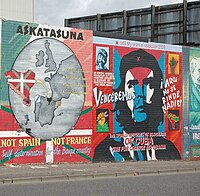
Make America Great Again. Trump’s campaign slogan was a direct appeal to nationalism. As a son of the Rust Belt city of Dayton, Ohio, I wasn’t surprised to see that it worked.
People in the postindustrial Midwest and in much of the rest of flyover country are tired of being ignored by the urban coastal elites who seem to think laid-off factory workers should shake off their blues and get a job as a coder. Not that the children of the dispossessed stand a better chance: Silicon Valley is a great wealth generator but a lousy job creator. Many highly skilled American tech workers are unemployed, cheated out of jobs by sleazy companies who abuse the H1B visa program to hire compliant foreigners for a fraction of the cost.
If you’re one of the millions of left-leaning Americans shocked and awed at Donald Trump’s first week as president, his “America First” inauguration speech, his orders to build his Mexican border wall, tear up NAFTA, start a trade war, and especially the sudden brutalism of his Muslim travel ban, I have news for you: there are just as many others who are cheering him on, thrilled that he’s keeping his campaign promises. As far as they’re concerned, the rest of the world — including refugees from countries whose wars were started by the U.S. — can go to hell.
After all, their hometowns already have.
As Sabrina Tavernise recently wrote in The New York Times, victims of economic decline and their attendant societal ills — depression, alcoholism, the meth and opioid epidemics — revolted in the 2016 election against elites “who lived in isolated islands of economic opportunity and sneered at people who didn’t.” She cited NYU social psychologist Jonathan Haidt, who sees a clash between globalists and nationalists. “The globalists, who tend to be urban and college-educated, want a world like the one described in John Lennon’s song ‘Imagine’ — no religion, walls or borders dividing people. The nationalists see that as a vision of hell…They also want to limit immigration, an instinct that globalists are often to quick to condemn as racist.”
Globalism dominates economic policymaking in the Democratic Party. Beginning with the takeover of the party by the Clintons’ Democratic Leadership Council in the early 1990s, Democrats have pushed through free trade agreements like NAFTA and CAFTA, and the creation of the World Trade Organization. This has not come without consequences: Globalization eroded the power of Big Labor, formerly a major source of income and manpower for the party. It also turned off people in Ohio and Michigan and Illinois and Pennsylvania — those who lost their own jobs, as well as their friends, families and neighbors. Democratic politicians have been so blind to the suffering all around that they never even once proposed a bill that would have helped victims of outsourcing with money or job retraining. Some even publicly praised the fact that wages were going up in places like Mexico! Trump gave long-seething Americans an outlet for their rage.
The globalist left vs. nationalist right paradigm, however, is a recent thing. In fact, the right part of that equation only dates back to last summer; pre-Trump, exporting American jobs via trade deals was a point of bipartisan consensus.
The short history of Democratic globalism suggests that one way back from defeat and political irrelevance, both for the party and for the broader Left, is to make the case for a leftist nationalism.
Until the 1970s, Republicans promoted free trade agreements. Democrats opposed them. Protecting workers, especially the highly-paid blue-collar laborers, from foreign competition, kept union donations pouring into party coffers. But then party fundraisers found Wall Street. Big finance craves freedom of movement for capital so business owners can find the cheapest raw materials, supplies and workers in the world — and a broken, dispirited workforce unable to organize and bargain collectively. Wall Street told the Democrats: dump your other girlfriend. You can’t have us as well as big labor. Workers have gotten ground up under the bus ever since.
The grassroots campaign of Bernie Sanders — and of Donald Trump, whose fundraising tactics and social media-driven campaign emulated Sanders’ down to the fonts and spacing of his email solicitations — have broken big corporate donors’ hold on campaign financing. Meanwhile, look what happened to Hillary Clinton (“My dream is a hemispheric common market, with open trade and open borders“) and her base of corporate and wealthy individual backers. Nationalism, not globalism, is the future of American politics — but right now, it’s only the right that’s riding the wave.
Though patriotism is the last refuge of the scoundrel and the first of the nativist, history shows us a long and honorable record of left-wing nationalism. The Chinese civil war turned in favor of the Communists over Chiang Kai-Shek’s Nationalists after Mao Tse-Tung directed his cadres to lead the patriotic resistance against Japanese occupation. Most members of the French Resistance against the Nazis were communist. Fidel Castro was an ardent patriot/nationalist; so was Ho Chi Minh. These leftists understood that the oppression of workers by the ruling class often manifests itself via forms of globalization: invasions, colonialism, the establishment of puppet states via imperialism. It is not necessary to succumb to the dark forces of bigotry, or to deny refuge to victims of war as Trump did last week, to stand up for the citizens of your own country against those who would exploit or abuse them.
There’s nothing wrong with imagining a world without borders. It’s good for Americans, and for decency, when wages of workers in other nations increase — there are fewer wars and more consumers. As things stand today, however, nation-states are here to stay. In fact, there are more of them than ever before.
Is it really so unreasonable for American workers to expect the leftists who claim to care about them, to fight for them to earn higher wages? A left unable to appeal to nationalism has no future.
(Ted Rall is author of “Trump: A Graphic Biography,” an examination of the life of the Republican presidential nominee in comics form. You can support Ted’s hard-hitting political cartoons and columns and see his work first by sponsoring his work on Patreon.)
SYNDICATED COLUMN: The Four Horsemen of the American Apocalypse

What the Media Can’t/Won’t Tell You About Why Russia Invaded Ukraine
As usual, America’s foreign correspondents are falling down on the job.
Stories devoid of historical context cast Russia’s invasion of Ukraine as a naked act of neo-Soviet aggression. Considering that the relevant history begins a mere two decades ago, its omission is inexcusable.
The spark that led to the takeover of Crimea was not the overthrow of President Viktor Yanukovich. It is what happened the day after.
A 2012 law gave the Russian language official status in regions where Russians comprise more than 10% of the population. This is the case in most of eastern Ukraine and particularly in Crimea, where 59% are ethnic Russians.
One week ago, Ukraine’s rump parliament (members of Yanukovich’s party, hiding from opposition forces and in fear for their lives, didn’t show up) took advantage of Yanukovich’s downfall to overturn the language law. Americans didn’t notice, but Russians did.
“Attack on the Russian language in Ukraine is a brutal violation of ethnic minority rights,” Konstantin Dolgov, the Russian Foreign Ministry’s commissioner for human rights, tweeted that day.
Seems a little over-the-top, right?
Sure, but only if you don’t know that millions of ethnic Russians in former Soviet Republics have suffered widespread discrimination and harassment since the 1991 collapse — and that their troubles began with laws eliminating Russian as an official language.
Laws like the one passed last week in Ukraine.
The demise of the Soviet Union left 25 million Russians stranded in 14 newly independent states, in such countries as Belarus, Azerbaijan, Turkmenistan and Ukraine. These new countries had to scramble in order to create the trappings of national identity virtually overnight. They designed new flags, composed national anthems and printed new currency.
To instill a sense of loyalty and patriotism, the governments of many of the freshly-minted republics resorted to rank nationalism.
Nationalism isn’t just about what your country is. It’s also about what it isn’t. This requires defining some things — some people — as outsiders. Unwanted. Scapegoats. Enemies of the state.
Turkmenistan, a Central Asian dictatorship and former Soviet republic in Central Asia, is one example. It instituted a policy of “Turkmenization” after 1991. Russians, a privileged group before independence, were now refused work permits. A 2000 decree banned the use of the Russian language in official business; since Turkmenistan is a totalitarian state and all business is legally governmental, this reduced Russians who didn’t speak Turkmen to poverty and low-status jobs.
The Turkmen government abolished dual Turkmen-Russian citizenship, leading to the mass exodus of panicked Russians in 2003. Denaturalization — the stripping away of citizenship — followed. “Many people…were having to sell houses and apartments at far below market values in order to leave by the deadline,” reported the UN. Hundreds of thousands of people lost everything they owned.
“Over the past decade Russians have been systematically discriminated against, and currently hold no positions in Turkmenistan’s government or state institutions,” says the report.
Russians who remained behind after 2003 fared poorly. “On the streets of the eastern city of Turkmenabat, Russians appear to be rapidly becoming an underclass in a nation mired in poverty. Many scrape a living as taxi drivers, waitresses or in other low paying, insecure jobs.”
Harassment of Russians is rife throughout the former USSR. Every other Commonwealth of Independent States nation has abolished dual citizenship.
In the former Soviet Union, everyone knows that the road to statelessness, unpersonhood and poverty begins with the official elimination of Russian as an official language.
National language statutes targeted against Russian speakers are analogous to Nazi Germany’s Nuremberg Laws, which prevented Jews from holding jobs or even owning a radio: the beginning of the end. At the end of the Soviet period in 1989, the Tajik SSR passed a law establishing Tajik as the sole official language. Less than two decades later, 85% of ethnic Russians had left the country.
“The linguistic nationalization carried out in each republic provided a strong impetus to emigrate…Even if schools systematically introduce children to the official language today, the [former Soviet] states have established no programs to train adults,” Seymour Peyrouse noted in a 2008 report for the Woodrow Wilson Institute about the Central Asian republics. “It seems that the principal cause of emigration remains the absence of a future, or the perception of such, for the younger generations.”
Given recent history, it shouldn’t surprise anyone that ethnic Russians freaked out when one of the first official acts of Ukraine’s parliament was a linguistic nationalization law.
As for Russia’s response, you need to know two facts. First, Ukraine isn’t as independent of Russia as, say, Poland. None of the former Soviet republics are. “Kiev is an ancient Russian city,” Masha Gessen writes in Vanity Fair. “It is an overnight train ride from Moscow — closer than 90% of Russia is to the Russian capital. Russian citizens haven’t needed visas or even foreign-travel passports to go to Ukraine — the way U.S. citizens can enter Canada with only a driver’s license. Every store clerk, waiter, and taxi driver in Kiev speaks Russian.” And of course there’s the Black Sea Fleet. Really really independent countries don’t have 11,000 foreign troops stationed on their soil.
Had it been possible for rational diplomats and demographers to manage the Soviet collapse, Crimea probably would have wound up in Russia.
Until half a century ago, after all, Crimea was Russian. Nikita Khrushchev “gifted Crimea to Ukraine as a gesture of goodwill to mark the 300th anniversary of Ukraine’s merger with tsarist Russia. Not surprisingly, at the time, it did not occur to anyone that one day the Soviet Union might collapse and that Ukraine would again be an independent country,” writes The Moscow Times.
It’s easy to see why Vladimir Putin would invade, why Russian public opinion would support him, and why neither cares what America thinks. Back in September, after all, most Russians told pollsters Crimea is part of Russia.
Why are American reporters covering Crimea ignoring the big picture, and instead so focused on secondary distractions like how it makes Obama look and whether there’s a chance of a new Cold War?
Four horsemen of the journalism apocalypse afflict overseas reporting:
Journalistic stenography, in which attending a government press conference constitutes research.
Kneejerk patriotism, where reporters identify with their government and are therefore less likely to question its actions, while reflexively assuming that rivals of the U.S. are ill-intentioned.
Jack-of-all-trades journalism, in which the same writers cover too many different beats. A few decades ago, there would have been a bureau chief, or at least a stringer, who knew Ukraine and/or the former Soviet Union because he or she lived there.
American ahistoricism, the widespread and widely acceptable ignorance of politics and history — especially those of other countries.
All four horsemen are pulling the Crimea story, but the fourth — not being aware of stuff that happened just one generation ago — is the most embarrassing.
(Support independent journalism and political commentary. Subscribe to Ted Rall at Beacon.)
COPYRIGHT 2014 TED RALL, DISTRIBUTED BY CREATORS.COM
The Pope Code
65% of Americans say they agree with Pope Francis I’s critique of capitalism. But because we’re not allowed to publicly voice our opposition to capitalism, we resort to a sort of “dog whistle” — a “pope code” — in which we express our approval of the pope as an acceptable way to transmit our closet sympathies for socialism and communism.
Profiling the Mass Murderer
Friends and neighbors are shocked to learn the identity of the man suspected of coldly taking the lives of six people, all members of the same ethnic group. To those who keep track of extremist hate groups, however, the violence was not a surprise. For one thing, he was already under investigation for earlier, similar crimes

